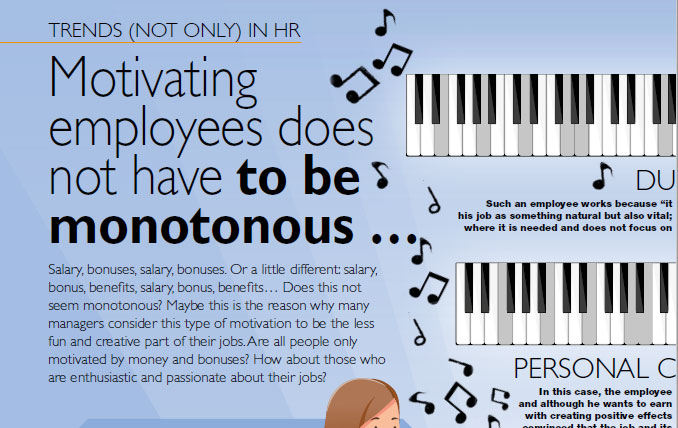
Motivating employees does not have to be monotonous …
Salary, bonuses, salary, bonuses. Or a little different: salary, bonus, benefits, salary, bonus, benefits… Does this not seem monotonous? Maybe this is the reason why many managers consider this type of motivation to be the less fun and creative part of their jobs. Are all people only motivated by money and bonuses? How about those who are enthusiastic and passionate about their jobs?
INFLOW
THE CHARACTERISTICS OF AN INFLOW-ORIENTED EMPLOYEE
An ‘inflow-oriented employee’ has most of his attention focused on what he can get or gain, and thus he is constantly estimating what the returns will be and whether he should waste his time and energy on a given job. There aren’t many things that make him enthusiastic about his work – except personal benefits or financial returns. He is in fact a ‘mercenary’ and not a team player.
Such an employee will recalculate his salary, demand refunds for every expense, and he will spend much of his work time demanding salary increases. This individual is likely to leave the company because he has to work extra hours or because the company decides to change its remuneration policy by linking salaries to actual production.
His attitude: First, you have to pay me and then I will figure out how much I will be willing to work.
OUTFLOW
THE CHARACTERISTICS OF AN OUTFLOW-ORIENTED EMPLOYEE
The attention of this person is focused primarily on his work and anything connected to it. It is not that he does not want to earn money, or benefits. No. But there are also other factors that motivate him. For example, he likes his job, and he finds it fulfilling. He supports the company’s purpose and vision. The organizational goals and targets make sense to him and he wants to be part of achieving them.
Since such a person really likes to work and it is natural for him to move things forward, this is where most of his attention is focused. You do not have to encourage him to work and contribute as he understands the basic principle of exchange – that he first needs to produce something and then he can expect something in return.
His attitude: When I produce enough valuable outflow, I will in return receive an inflow.
Use all tones
When you try to motivate employees who are inflow-oriented, playing the motivational keys on the imaginary keyboard will be very monotonous. You will often be forced to defend the way in which your company rewards staff, how the bonuses are calculated and how company cars are equipped. That would not be a lot of fun. And you will probably find out that the “repertoire” at this tone level is quite limited. In this case, playing a melodious tune is quite difficult. Both you and the employees will realise that the song is discordant.
On the other hand, when you motivate a person who is outflow-oriented, you will observe that it is a more natural and pleasant process. Just talking about his job, his successes and areas for improvement will have a positive effect on his motivation. The right fuel for such a person is creating, figuring things out and moving things forward as part of the team. Of course, provided that you pay him well for his production and customise his personal benefits, that is. For both parties this is then a “fantastic symphony”.
DUTY
Such an employee works because “it simply needs to be done”. He considers his job as something natural but also vital; he has no problem with assisting others where it is needed and does not focus on what he will be paid for doing so.
PERSONAL CONVICTION
In this case, the employee wants his job to have value, and although he wants to earn money, he is more concerned with creating positive effects through his job, and he is convinced that the job and its results are important.
PERSONAL GAIN
This employee works mainly for what he will get, but broader than just money. Examples: The workplace is close to his home and that is why he wants to work there. The workplace provides a car and meal vouchers.
MONEY
This employee works only for money and doesn’t care much about what he is doing. Such a person doesn’t care what your company does as long as you pay him enough. Loyalty is very low at this level.
▲ White keys represent ways in which to motivate employees on a Motivational Scale